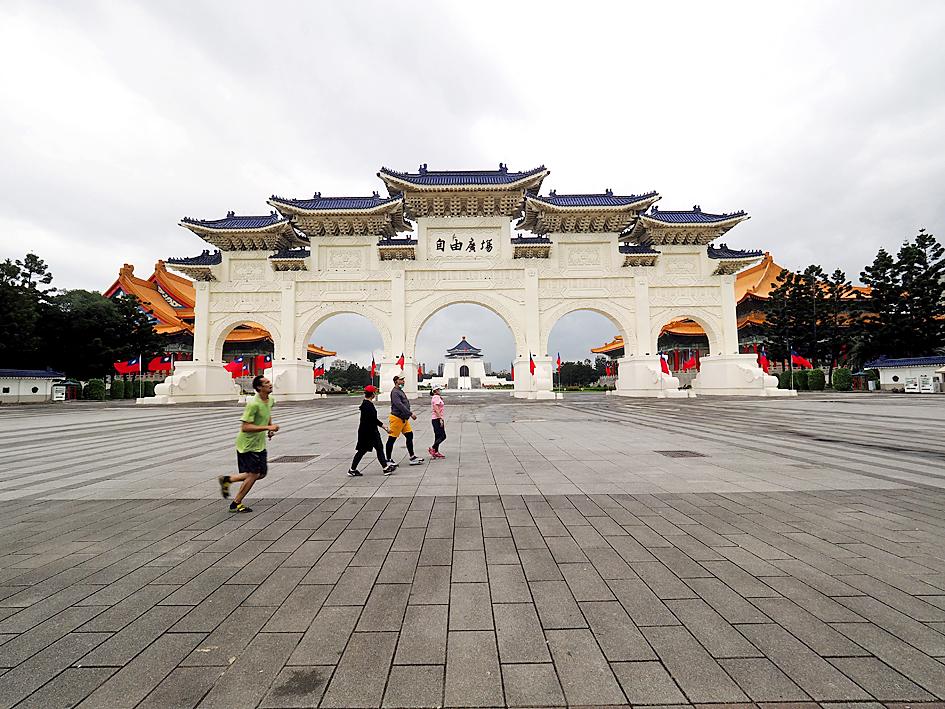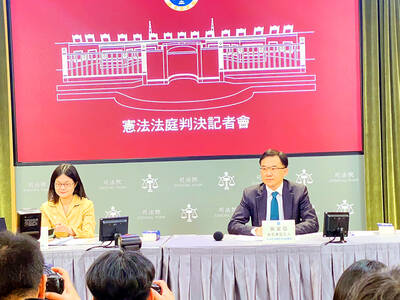The US remains the top power in the Indo-Pacific, but has suffered the biggest relative fall in its standing in the region over the past year, partly because of the loss of prestige over the mishandling of COVID-19, the Lowy Institute’s Asia Power Index shows.
Releasing the latest annual results yesterday, the Australia-based foreign policy think tank said while China’s standing had stalled, it remained in second place and was believed to be on track to match the US by the end of this decade.
Australia was one of the few countries to gain in the scores of comprehensive power this year, overtaking South Korea as the region’s sixth-most powerful country, helped by growth in its regional cultural influence and expanding defense cooperation.

Photo: David Chang, EPA-EFE
Taiwan (ranked 14th) and Vietnam (12th) were also on the rise.
“This year we’ve seen an acceleration in power shifts, but driven really more by underperformance than anything else,” project director Herve Lemahieu told the Guardian Australia. “That’s as a direct consequence of the pandemic.”
The competent handling of the COVID-19 pandemic by Taiwan, Vietnam and Australia “was a necessary, but not sole condition” for improving their regional standing, the institute report said.
The annual index aims to provide a snapshot of the shifts in influence in the fast-changing Indo-Pacific region, ranking 26 countries and territories by the overall power they wield.
The scores are based on 128 indicators, including three new indicators added this year to track perceptions of the handling of the pandemic, major ecological threats and defense dialogues.
While power shifts “happen only slowly outside of wartime,” the pandemic has triggered “a race to the bottom,” with 18 states in the Indo-Pacific region experiencing significant downward shifts in their relative power, the report said.
US President Donald Trump’s administration’s unilateral instincts was one reason why the US underachieved against its ability to wield broad-based power in Asia, it said.
“America has suffered the largest reputational hit in the region for its domestic and international handling of the COVID-19 pandemic,” the report said. “The result is a powerful reminder that legitimacy and leadership on the world stage start with the capacity of leaders to govern well at home.”
The report said that Taiwan had one of the biggest gains in diplomatic influence (+9.0), but lost the most points in resilience (-0.9). It also improved in cultural influence (+1.1), future resources (+0.8) and economic relationships (+0.4), while trending down in economic capability (-0.9), defense networks (-0.6) and military capability (-0.2).
“Taiwan exerts less influence in the region than expected given its available resources, as indicated by the country’s negative power gap score. While Taiwan is a net underachiever in Asia, its negative power gap improved in 2020,” the report said.
Additional reporting by staff writer

The US government has signed defense cooperation agreements with Japan and the Philippines to boost the deterrence capabilities of countries in the first island chain, a report by the National Security Bureau (NSB) showed. The main countries on the first island chain include the two nations and Taiwan. The bureau is to present the report at a meeting of the legislature’s Foreign Affairs and National Defense Committee tomorrow. The US military has deployed Typhon missile systems to Japan’s Yamaguchi Prefecture and Zambales province in the Philippines during their joint military exercises. It has also installed NMESIS anti-ship systems in Japan’s Okinawa

TRAGEDY STRIKES TAIPEI: The suspect died after falling off a building after he threw smoke grenades into Taipei Main Station and went on a killing spree in Zhongshan A 27-year-old suspect allegedly threw smoke grenades in Taipei Main Station and then proceeded to Zhongshan MRT Station in a random killing spree that resulted in the death of the suspect and two other civilians, and seven injured, including one in critical condition, as of press time last night. The suspect, identified as a man surnamed Chang Wen (張文), allegedly began the attack at Taipei Main Station, the Taipei Fire Department said, adding that it received a report at 5:24pm that smoke grenades had been thrown in the station. One man in his 50s was rushed to hospital after a cardiac arrest

ON ALERT: Taiwan’s partners would issue warnings if China attempted to use Interpol to target Taiwanese, and the global body has mechanisms to prevent it, an official said China has stationed two to four people specializing in Taiwan affairs at its embassies in several democratic countries to monitor and harass Taiwanese, actions that the host nations would not tolerate, National Security Bureau (NSB) Director-General Tsai Ming-yen (蔡明彥) said yesterday. Tsai made the comments at a meeting of the legislature’s Foreign Affairs and National Defense Committee, which asked him and Minister of National Defense Wellington Koo (顧立雄) to report on potential conflicts in the Taiwan Strait and military preparedness. Democratic Progressive Party (DPP) Legislator Michelle Lin (林楚茵) expressed concern that Beijing has posted personnel from China’s Taiwan Affairs Office to its

‘ILLEGAL RULING’: The KMT and the TPP slammed the Constitutional Court judgement, saying it contravened the law and was trying to clear the way for a ‘green dictatorship’ The Constitutional Court yesterday ruled that amendments to the Constitutional Court Procedure Act (憲法訴訟法) passed by the Legislative Yuan last year are unconstitutional, as they contravene due legislative process and separation of powers. The Legislative Yuan on Dec. 20 last year passed amendments stipulating that no fewer than 10 grand justices must take part in deliberations of the Constitutional Court, and at least nine grand justices must agree to declare a law unconstitutional. The Executive Yuan on Jan. 2 requested that lawmakers reconsider the bill, but the Legislative Yuan, under a combined majority of Chinese Nationalist Party (KMT) and Taiwan People’s Party